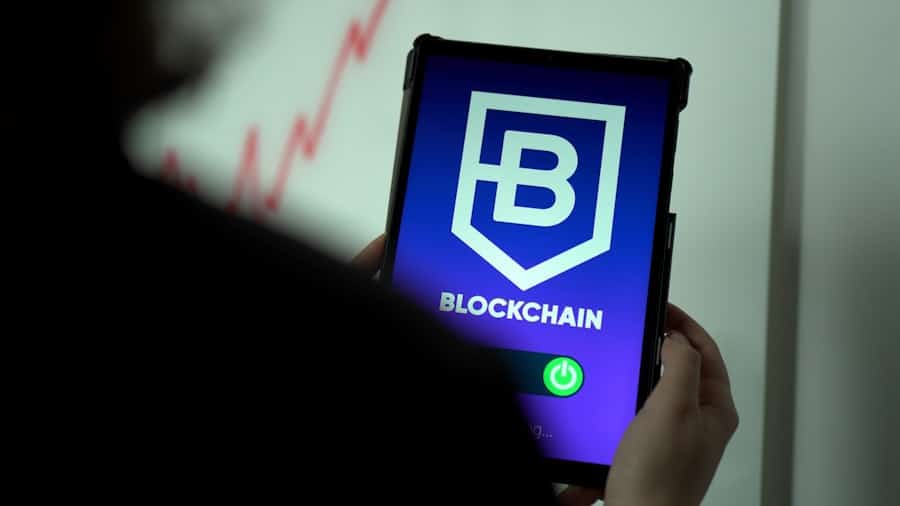Blockchain technology has emerged as a revolutionary force in the digital landscape, fundamentally altering how data is stored, shared, and secured. At its core, blockchain is a decentralized ledger that records transactions across multiple computers in such a way that the registered transactions cannot be altered retroactively without the consensus of the network. This characteristic of immutability, combined with transparency and security, makes blockchain an attractive solution for various industries, including finance, supply chain management, and healthcare.
The technology operates on a peer-to-peer network, where each participant has access to the entire database and its complete history, ensuring that all transactions are visible and verifiable. The potential applications of blockchain extend far beyond cryptocurrencies like Bitcoin. In particular, its ability to provide a secure and transparent method for tracking products throughout their lifecycle has garnered significant attention.
As global trade continues to expand, the need for reliable systems to verify the authenticity of products has become increasingly critical. Counterfeit goods not only pose risks to consumer safety but also undermine brand integrity and economic stability. Thus, exploring how blockchain can be harnessed to combat counterfeiting is essential for businesses and consumers alike.
Key Takeaways
- Blockchain technology is a decentralized and secure way of recording transactions and tracking assets.
- Current challenges in anti-counterfeit product tracking include the difficulty of verifying product authenticity and the lack of transparency in supply chains.
- Blockchain can play a crucial role in anti-counterfeit product tracking by providing a transparent and immutable ledger for tracking the movement of products.
- Advantages of using blockchain for product tracking include increased transparency, improved traceability, and enhanced security against counterfeit products.
- Case studies have shown successful implementation of blockchain in anti-counterfeit product tracking, such as in the pharmaceutical and luxury goods industries.
Current Challenges in Anti-Counterfeit Product Tracking
The fight against counterfeit products is fraught with challenges that complicate efforts to ensure product authenticity. One of the primary issues is the lack of transparency in supply chains. Many products pass through numerous intermediaries before reaching the end consumer, making it difficult to trace their origins.
This opacity allows counterfeiters to infiltrate legitimate supply chains, often resulting in significant financial losses for brands and posing health risks to consumers. For instance, counterfeit pharmaceuticals can lead to ineffective treatment or even fatal consequences for patients who unknowingly consume them. Another significant challenge is the technological fragmentation within industries.
Different stakeholders often use disparate systems for tracking products, leading to inconsistencies in data and communication breakdowns. This fragmentation not only complicates the verification process but also creates opportunities for counterfeiters to exploit gaps in the system. Additionally, traditional tracking methods, such as barcodes or RFID tags, can be easily replicated or tampered with, further exacerbating the problem.
As a result, businesses are increasingly seeking innovative solutions that can provide a more robust framework for product tracking and verification.
The Role of Blockchain in Anti-Counterfeit Product Tracking

Blockchain technology offers a promising solution to the challenges faced in anti-counterfeit product tracking by providing a secure and immutable record of transactions. Each product can be assigned a unique digital identity on the blockchain, which is updated at every stage of its journey through the supply chain. This digital identity can include information such as the product’s origin, manufacturing details, and ownership history.
By leveraging smart contracts—self-executing contracts with the terms of the agreement directly written into code—stakeholders can automate verification processes and ensure compliance with established standards. Moreover, blockchain’s decentralized nature means that no single entity has control over the entire database, reducing the risk of manipulation or fraud. Each participant in the supply chain can access the same information in real-time, fostering collaboration and trust among stakeholders.
This level of transparency not only enhances consumer confidence but also empowers brands to take proactive measures against counterfeiting.
Advantages of Using Blockchain for Product Tracking
The advantages of utilizing blockchain technology for product tracking are manifold. One of the most significant benefits is enhanced traceability. With every transaction recorded on an immutable ledger, stakeholders can trace a product’s journey from its origin to its final destination with unprecedented accuracy.
This traceability is particularly crucial in industries such as food and pharmaceuticals, where knowing the source of a product can be vital for safety and compliance purposes. Additionally, blockchain technology can significantly reduce costs associated with counterfeiting. By streamlining verification processes and minimizing the need for intermediaries, businesses can save on operational expenses while simultaneously protecting their brand reputation.
The ability to quickly identify counterfeit products also allows companies to respond more effectively to incidents of fraud, thereby mitigating potential losses. Furthermore, as consumers become increasingly aware of counterfeiting issues, brands that adopt blockchain solutions may gain a competitive edge by demonstrating their commitment to authenticity and transparency.
Case Studies of Successful Implementation of Blockchain in Anti-Counterfeit Product Tracking
Several companies have successfully implemented blockchain technology to combat counterfeiting, showcasing its potential across various sectors. One notable example is De Beers, a leading diamond company that has integrated blockchain into its supply chain to ensure the provenance of its diamonds. By using a blockchain platform called Tracr, De Beers tracks each diamond from mine to market, providing consumers with verifiable proof of authenticity and ethical sourcing.
This initiative not only enhances consumer trust but also helps combat the trade of conflict diamonds. Another compelling case is that of Everledger, a startup focused on creating a digital registry for high-value assets such as wine and luxury goods. Everledger uses blockchain technology to record the provenance of these items, allowing consumers and retailers to verify their authenticity easily.
For instance, in the wine industry, counterfeit bottles can significantly impact brand reputation and consumer safety. By providing a transparent history of each bottle’s journey—from vineyard to retailer—Everledger empowers consumers to make informed purchasing decisions while protecting brands from fraudulent activities.
Potential Future Developments in Blockchain Technology for Anti-Counterfeit Product Tracking

As blockchain technology continues to evolve, its applications in anti-counterfeit product tracking are likely to expand further. One potential development is the integration of Internet of Things (IoT) devices with blockchain systems. IoT sensors can provide real-time data on product conditions during transit—such as temperature or humidity—ensuring that products are stored and transported under optimal conditions.
By linking this data to a blockchain ledger, stakeholders can gain deeper insights into product integrity while enhancing traceability. Moreover, advancements in artificial intelligence (AI) could complement blockchain solutions by enabling more sophisticated data analysis and anomaly detection. AI algorithms could analyze patterns in transaction data to identify potential counterfeiting activities or supply chain inefficiencies.
By combining AI with blockchain’s immutable records, businesses could create a more robust defense against counterfeiters while optimizing their supply chain operations.
Regulatory and Legal Considerations for Blockchain in Anti-Counterfeit Product Tracking
The implementation of blockchain technology in anti-counterfeit product tracking also raises important regulatory and legal considerations that must be addressed for widespread adoption. One key issue is data privacy; while blockchain offers transparency, it also involves sharing sensitive information among multiple stakeholders. Striking a balance between transparency and privacy will be crucial in ensuring compliance with regulations such as the General Data Protection Regulation (GDPR) in Europe.
Additionally, intellectual property rights must be considered when using blockchain for product tracking. Companies need to ensure that their proprietary information is adequately protected while still allowing for necessary transparency within the supply chain. Establishing clear legal frameworks around ownership and liability will be essential as businesses navigate this new landscape.
The Future Impact of Blockchain on Anti-Counterfeit Product Tracking
The future impact of blockchain technology on anti-counterfeit product tracking holds immense promise as industries continue to grapple with the challenges posed by counterfeit goods. By providing a secure and transparent method for tracking products throughout their lifecycle, blockchain has the potential to revolutionize how businesses approach authenticity verification. As more companies recognize the value of adopting this technology, we can expect to see increased collaboration among stakeholders aimed at creating comprehensive solutions that address counterfeiting issues.
Moreover, as technological advancements continue to emerge—such as IoT integration and AI-driven analytics—the capabilities of blockchain in this domain will only expand further. The convergence of these technologies could lead to more sophisticated systems that not only enhance traceability but also improve overall supply chain efficiency. Ultimately, as consumer awareness grows regarding counterfeiting risks, businesses that leverage blockchain technology will likely gain a competitive advantage by fostering trust and transparency in their operations.
In a recent article from Enicomp, the focus is on how to choose the right iPhone for you in 2023. This article discusses the various factors to consider when selecting the perfect iPhone model to suit your needs and preferences. As technology continues to advance, it is essential to stay informed about the latest features and capabilities of smartphones to make an informed decision. This article provides valuable insights into the considerations to keep in mind when choosing the right iPhone for you in 2023.
FAQs
What is blockchain technology?
Blockchain is a decentralized, distributed ledger technology that records transactions across multiple computers in such a way that the recorded transactions cannot be altered retroactively.
How does blockchain technology help in anti-counterfeit product tracking?
Blockchain technology helps in anti-counterfeit product tracking by providing a secure and transparent way to record and track the movement of products throughout the supply chain. This helps in verifying the authenticity of products and preventing counterfeit products from entering the market.
What are the benefits of using blockchain for anti-counterfeit product tracking?
Some of the benefits of using blockchain for anti-counterfeit product tracking include increased transparency, improved traceability, reduced fraud, and enhanced consumer trust. Blockchain also enables real-time tracking of products, which can help in identifying and addressing counterfeit products more effectively.
What are some real-world applications of blockchain in anti-counterfeit product tracking?
Some real-world applications of blockchain in anti-counterfeit product tracking include using blockchain to track the origin and movement of pharmaceuticals, luxury goods, electronics, and other high-value products. Blockchain can also be used to verify the authenticity of food products and prevent the distribution of counterfeit goods.
What are the challenges of implementing blockchain for anti-counterfeit product tracking?
Some of the challenges of implementing blockchain for anti-counterfeit product tracking include the need for industry-wide collaboration, the integration of blockchain with existing supply chain systems, and the scalability of blockchain technology to handle large volumes of product tracking data. Additionally, there may be regulatory and privacy concerns that need to be addressed when implementing blockchain for anti-counterfeit product tracking.

